|
|
|
Sort Order |
|
|
|
Items / Page
|
|
|
|
|
|
|
| Srl | Item |
| 1 |
ID:
122773
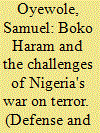

|
|
|
|
|
| Publication |
2013.
|
| Summary/Abstract |
Boko Haram terrorism has been recognized by Nigerian President Jonathan as the most threatening and complex security issue in Nigeria since independence. In response, the Federal Government of Nigeria has committed itself to different counterterrorism measures, which are largely dominated by "hard politics" and military mobilization. Spending heavily on defense to upgrade military hardware and train personnel in a counterterrorism role, Nigeria has also boosted its strategic importance in the "Global War on Terror". However, this attempt has become unpopular as it has failed to contain Boko Haram within a short time frame and has made insufficient headway against unabated terror, with human rights costs among the host communities and amidst a surge of stakeholders' discordance. As a matter of concern, this article seeks to assess Boko Haram as an opponent in Nigeria's war on terror (WOT) and to ascertain the challenges the country faces, the alternative measures open to it, and possible ways forward.
|
|
|
|
|
|
|
|
|
|
|
|
|
|
|
|
| 2 |
ID:
122771
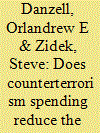

|
|
|
|
|
| Publication |
2013.
|
| Summary/Abstract |
Following the 11 September 2001 attacks, the US government increased its counterterrorism (CT) funding and created several Federal Agencies such as the Department of Homeland Security; Transportation Security Administration; and National Counterterrorism Center. Similarly, the 7 July 2005, London bombings also compelled the British government to increase its CT funding. These examples illustrate a phenomenon that when states experience terrorism, they dramatically increase public safety spending in order to reduce or eliminate the incidents of and casualties resulting from acts of terror. Using statistical data collected from 34 countries covering nine years, this article examines recent CT spending increases. Critically, the authors explore whether recent public safety expenditures can measurably reduce the number of domestic and international terrorist attacks. The implications of their findings should be salient for policy-makers' assessments of their countries' current CT strategies and policies concerning their respective Intelligence and Security Communities.
|
|
|
|
|
|
|
|
|
|
|
|
|
|
|
|
| 3 |
ID:
122772
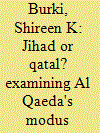

|
|
|
|
|
| Publication |
2013.
|
| Summary/Abstract |
There is widespread acknowledgment that the modus operandi of jihadis affiliated with Al Qaeda and associated movements (AQAM) relies on brutal terror-inducing tactics which, more often than not, target Muslim and non-Muslim non-combatants. This article comparatively analyzes the AQAM modus operandi within the traditional stipulations of Islamic precepts with respect to waging jihad al saghir. The purpose is to glean whether or not such tactics such as suicide bombings, declaring fellow Muslim apostates in order to kill them, use of IEDs and EFPs to target civilians, constitute legitimate rules of engagement in jihad al saghir.
|
|
|
|
|
|
|
|
|
|
|
|
|
|
|
|
| 4 |
ID:
122770
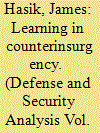

|
|
|
|
|
| Publication |
2013.
|
| Summary/Abstract |
Since the publication in 2002 of John Nagl's Learning to Eat Soup with a Knife, organizational learning has been widely presumed an important ingredient for success in counterinsurgency. But sampling the literature from before and after this time shows remarkably little analytical treatment of the issue of learning and even confusion over what it may mean. This article considers the theories, hypotheses, research strategies, threats to validity, methods of measurement, treatments of time, and general lack of statistical analysis in the work to date and recommends a course for future research.
|
|
|
|
|
|
|
|
|
|
|
|
|
|
|
|
| 5 |
ID:
122769
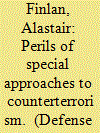

|
|
|
|
|
| Publication |
2013.
|
| Summary/Abstract |
The death of Jean Charles de Menezes on the London Underground in 2005 remains a horrifying example of what happens when counterterrorism goes wrong. One of the extraordinary features of the shooting was the remarkable number of special elements, police units, military Special Forces, and unusual procedures and tactics involved in the incident. This article attempts to assess the causal significance of the special dimension in the horrific chain of circumstances. It does so by interrogating numerous explanations for the tragedy and highlighting the role of the special factor. The Stockwell shooting remains very important today because it casts a sharp and somewhat harsh spotlight on the particular pitfalls of special responses, measures and units to the multitudinous threats posed by international terrorism in the twenty-first century.
|
|
|
|
|
|
|
|
|
|
|
|
|
|
|
|
| 6 |
ID:
122768


|
|
|
|
|
| Publication |
2013.
|
| Summary/Abstract |
Though it is nigh on 12 years since 9/11, there is still no agreed definition of terrorism. Indeed, the original nations of the "Coalition of the Willing," who previously pursued a "War on Terror" so vigorously (Australia, Britain and the USA) have come full circle now to disown entirely the very notion of a "War on Terror." A key stumbling point towards a definition remains whether terrorism should be classified as an act of crime or of war. The two conceptualisations are philosophically and fundamentally opposed and inevitably from each flows entirely different strategic prescriptions to counter the phenomenon. If policy is to be guided adequately, let alone optimally, the philosophical arguments of each camp must be thrown headlong into one another, with the last philosophy standing the victor and then claiming the policy spoils.
|
|
|
|
|
|
|
|
|
|
|
|
|
|
|
|
|
|
|
|
|